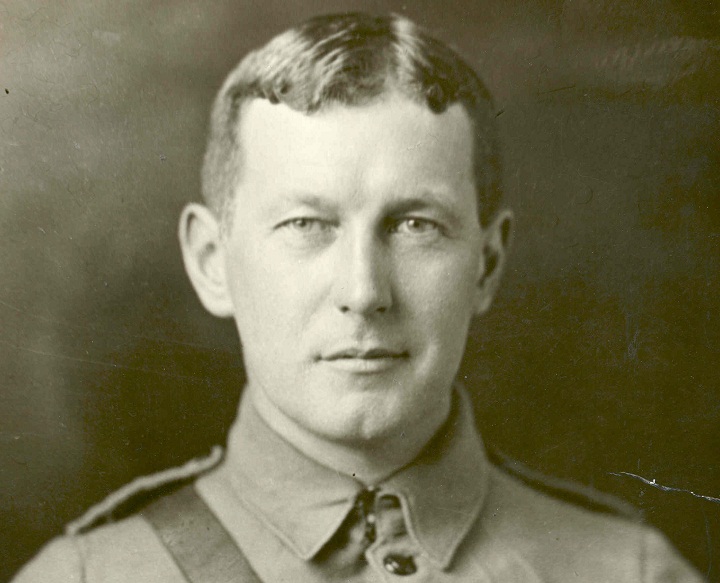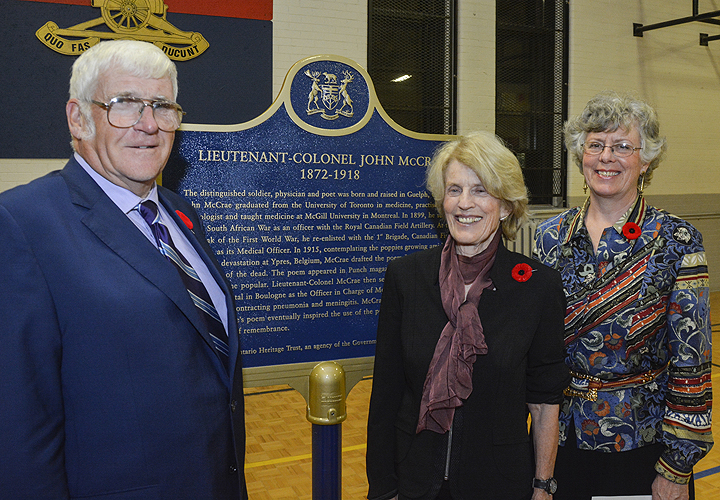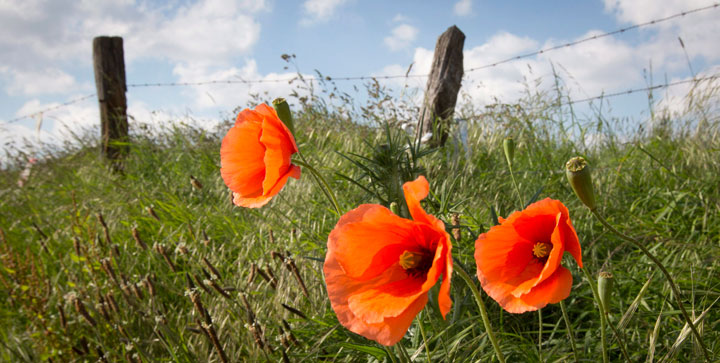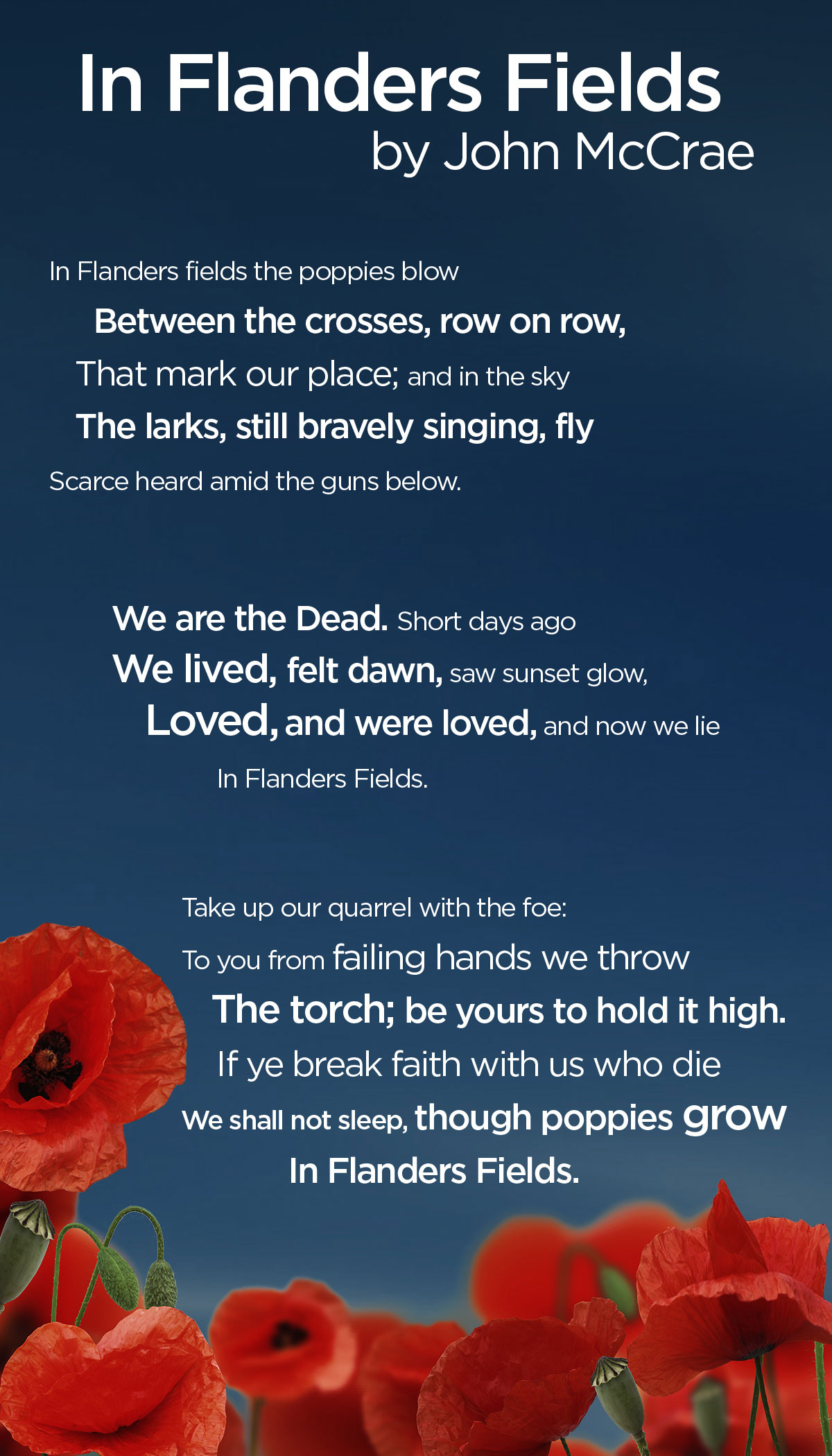Every year on Nov. 11, Lt. Col. John McCrae’s poem “In Flanders Fields” is recited as Canadians remember those lost in the line of duty and honour those who continue to serve.

The poem continues to resonate in Canada and Britain on Remembrance Day. On Thursday, a ceremony took place to honour McCrae in his hometown of Guelph, Ont.
A provincial plaque was unveiled commemorating the life and works of the soldier, poet and physician. The presentation, held at the Guelph Armoury, is part of Ontario Heritage Trust’s program commemorating “significant people, places and events in Ontario’s history.”
Members of the 11th Field Artillery Regiment were present, along with four cadet groups and members of the John McCrae museum and the city. The service included a video address by Canadian historian Jack Granatstein and reading of “In Flanders Fields.”
On Tuesday, students and teachers from John McCrae Public School – where the plaque will ultimately reside – will hold a ceremony and dedication service.
“If you talk to your average Canadian, many will think he came from Montreal, some people don’t even know he’s Canadian. But he’s born and raised in Guelph,” Sean Fraser, the director of heritage programs and operations at Ontario Heritage Trust, told Global News.
McCrae was born on Nov. 30, 1872. His childhood home still stands today as a museum and memorial.
He started writing poetry when he was a student at Guelph Collegiate Institute, and joined the Highfield Cadet Corps in Guelph at the age of 14.
He attended the University of Toronto on a scholarship, graduating with an arts degree in 1894, later returning to study medicine. After graduating with a Bachelor of Medicine degree, he worked in various hospitals before sailing to fight in the South African War.
Much of his life was spent practicing and teaching medicine.
READ MORE: John McCrae to be inducted into Medical Hall of Fame
When Britain declared war on Germany on Aug. 9, 1914, McCrae was one of 45,000 Canadians who quickly signed up to fight. “When the war broke out he felt compelled to join up,” said Fraser. He told a friend before leaving that he was afraid, but it was his duty to go.
“It is a terrible state of affairs, and I am going because I think every bachelor, especially if he has experience of war, ought to go. I am really rather afraid, but more afraid to stay at home with my conscience.” (From ‘In Flanders Fields: The Story of John McCrae’ by John Prescott).
McCrae, with the First Brigade of the Canadian Field Artillery, worked in the trenches in the Second Battle of Ypres in an area known as Flanders. The battle saw some of the heaviest fighting in the war. “This was Canada entering into the worst combat it ever had to,” said Fraser, describing the battle. “It was just about as bad as it could be.”
McCrae wrote to his mother of the death that surrounded him.
“The general impression in my mind is of a nightmare. We have been in the most bitter of fights. For seventeen days and seventeen nights none of us have had our clothes off, nor our boots even, except occasionally. In all that time while I was awake, gunfire and rifle fire never ceased for sixty seconds ….. And behind it all was the constant background of the sights of the dead, the wounded, the maimed, and a terrible anxiety lest the line should give way.” (From ‘In Flanders Fields: The Story of John McCrae’ by John Prescott).
After its publishing in 1915 in U.K. magazine Punch, McCrae’s poem quickly became one of the most famous works about the First World War.
“Suddenly he had soldiers from all over the empire coming up to him, asking him to write it on a piece of paper for them,” said Fraser.
The poem was translated into different languages and in 1917 became the backdrop for an initiative to sell victory bonds in Canada. The victory bonds campaign hoped to raise $150 million – but with McCrae’s works and imagery gracing billboards in Canada, the campaign raised $400 million.
His words are, in large part, why the poppy was adopted as a symbol of remembrance in 1921. “That icon that you see every year on Remembrance Day, that’s from McCrae’s poem,” said Fraser. It’s one of the most far-reaching poems about the First World War, said Fraser, and yet, “most people think it’s a Brit who wrote the thing.”
“But it’s really a hometown story,” said Fraser.
Nearly 100 years since it was published, “In Flanders Fields” remains a solemn part of Remembrance Day ceremonies across Canada.
While the poem was adopted by the anti-war movement, it’s really a reflection of that era — a rallying cry, explained Fraser.
“It’s the voice of the dead speaking to you,” he said. Being a physician, McCrae was used to empathy — “he gives a voice to the dead,” said Fraser.
























Comments